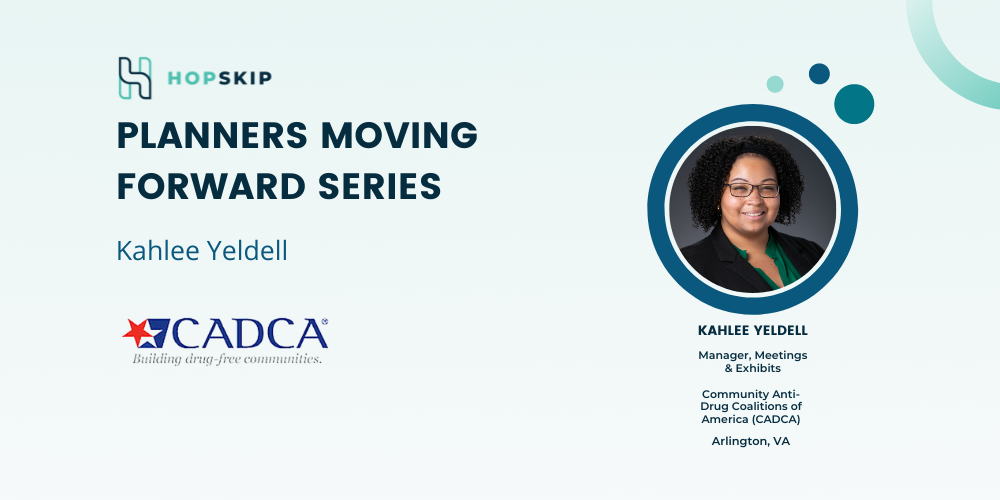This post is part of the HopSkip Planner Spotlight Series where HopSkip spotlight's planners across the industry to bring awareness of how they adapted to COVID-19, communicating and lessons learned and sharing how they are viewing the meetings and events industry in a post-pandemic world.
Name: Kahlee Yeldell
Company Name: Community Anti-Drug Coalitions of America (CADCA)
Job Title: Manager, Meetings & Exhibits
Years of Experience: 10+
How do you think you are positioned, after months of persevering with the pandemic, to take advantage of our new and disrupted meetings/events landscape?
Successful meeting planners are naturally adaptive. Because we've been so used to problem solving and pivoting in real time for the better part of a decade, this new meetings landscape is another type of evolution for our industry. Many of us felt the pressure to justify the value of conferences and other convenings in the last two years and have developed skills that we never dreamed of needing or using. Not once before 2020 did I see myself truly delving into the digital event world like I did but here we are. Three successful virtual events later and I feel confident that we could execute virtually again (if need be) but also that there is a population eager to return to in-person meetings even if those meetings look and feel differently.
As our community moves forward with planning in person meetings, what new technologies or processes are you implementing that you may have not looked at before?
The first 9 months under COVID lockdown proved just how important cleaning, sanitizing and avoiding high-touch surfaces was to staying healthy. I can't count how many times I observed people in public restrooms singing the "Happy Birthday" song in their heads to ensure they were scrubbing long enough. While I think new self-cleaning anti-microbial technology and the improvement of contactless systems for nearly everything helped raise the comfort levels of attendees and planners alike, I believe that the reinforcement of healthier practices have gone a long way to getting meetings, events and tourism back in business. At our organization, we do not see returning to a person-to-person check-in process or pre-stuffed conference bags in the near future. Additionally, QR codes will be abundantly used for items like accessing programs and handouts or swapping contact information.
As we see virtual meetings transition back to face to face, hybrid meetings are beginning to be the vehicle to return to normalcy. What are your thoughts on hybrid meetings versus traditional fully in person meetings?
I'm a people person. I'm always going to desire an in-person meeting over a virtual one. My personal feelings aside, I love how our industry embraced, helped cultivate and challenge various digital delivery systems to step up their abilities to make virtual learning and engagement relevant and sustainable. And sometimes even fun. We were fortunate to be able to work with our longstanding AV partner company to deliver educational training events with unexpected elements that kept attendees involved and attentive for 3 multiple-day events between March 2020 and July 2021. I think it's undeniable that virtual events offer a greater reach and accessibility than in-person events (no travel, events across time zones, on-demand viewing etc) and the ability to be able to provide content long after the meeting's over. Unfortunately, the interpersonal exchange and effective networking that is a huge justification for a lot of events, is hard to replicate in the virtual space.
In your opinion, what do you think the biggest value for your attendees is in regards to returning to live events?
Many attendees are missing the interpersonal connections and satisfaction they receive by attending in-person events. Any association that holds an annual event has seen first-hand the reunion-like feeling of attendees who only see some of their peers at this one event. This ability to exchange work and industry updates, learn collaboratively and encourage one another may have been undervalued until COVID forced us all into isolation. Additionally, exhibitors who have vital goods and services to share had to rely on digital marketing over in-person outreach. I think the majority of attendees are excited and eager to (safely) re-engage with their peers and hear from experts in their field.
As the pandemic fades away and we return to face-to-face events what do you hope changes, either for planners or hoteliers, in the traditional RFP and proposal process as a result of all of the learnings from the last 20+ months?
Nothing shows the strength (or weakness) of a good contract like a global pandemic. The phrase "we're in this together" truly encapsulates the last 20+ months. Those fortunate to get out of event contracts with little to no damages were fortunate. While I'm a planner, it was heartbreaking knowing that our cancelled events impacted so many on the hotel and supplier side's livelihoods. My hope for the future is that we all are able to approach future sourcing and contracts with similar doses of understanding and realism about meeting in this new climate.
This post is part of the HopSkip Planner Spotlight Series where HopSkip spotlight's planners across the industry to bring awareness of how they adapted to COVID-19, communicating and lessons learned and sharing how they are viewing the meetings and events industry in a post-pandemic world.
